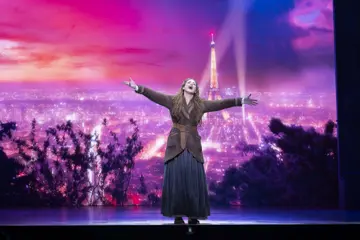After helming two Paranormal Activity sequels (3 and 4, if you're scoring at home) and a teen psuedo-zombie movie called Viral, Schulman and Joost have returned to their roots with a new film, Nerve, about modern online life. Like Catfish, they're hoping that it too can spark a dialogue and have a cultural life beyond its running time.
"Just because 100,000 people are doing something doesn't make it okay. Just because you have an online handle, or you use a different name, doesn't mean that you don't need to own up to your actions."
"Catfish became an access point for people to have a conversation that really needed to be had," says Schulman. "I hope that Nerve, in the same way, can help people talk about cyber-bullying, and privacy, and how we're all living our lives on the screen."
"We wanted to make a film," adds Joost, "that was entertaining above all, but that you could spend hours talking about the issues in it afterwards. I hope people have fun seeing it, and then it starts a conversation."
Don't miss a beat with our FREE daily newsletter
And Nerve is plenty fun. It stars Emma Roberts as an everygirl New York teen who signs up to an app called Nerve. Users are either players or watchers, with players undertaking dares from watchers for crowd-sourced cash and internet celebrity. Like many game apps, it's addictive, seductive and life-changing; a socially liberated Roberts is soon throwing off her bookish anxieties, sticking it to her condescending BFF Emily Meade and making out with Dave Franco. But, inevitably, things turn dark and thrilleresque. Nerve serves as both a study of the name/fame-making thrills of these online times and a commentary on Gamergate culture, Twitter mobs, the mobilising of trolls and the often horrifying online harassment of women.
"We take the responsibility of making mainstream films very seriously. We want them to be entertaining, but we don't want them to exist in a vacuum, sealed off from social issues," says Schulman. "The two things that stood out to us most are mob mentality, and online bullying – trolling. It's very easy to become an antagonising commenter on social media, it's easy to say things to make people feel bad about themselves. We wanted to make a film about taking responsibility for your actions online, to get people to question the safety of the crowd. Just because 100,000 people are doing something doesn't make it okay. Just because you have an online handle, or you use a different name, doesn't mean that you don't need to own up to your actions. We tried to devise a game that's not dangerous unto itself, but could be used that way. We also wanted to make sure the main character was a person who did the right thing, because films can be very influential, and we don't want to add any more harm to this already fucked up world."
Nerve is indeed a light, bright teen film, but its most obvious cinematic inspiration is David Fincher's 1997 Scrooge tale The Game, in which Michael Douglas is drawn into an elaborate, immersive and high risk scavenger hunt. "The Game was definitely an influence," admits Joost. "We watched Risky Business, it's one of our favourite films, a huge inspiration. We looked at After Hours, a Scorsese film, because it also takes place all in one night in New York City. And, we also, believe it or not, looked at the work of Wong Kar-wai, to try and capture that sense of the endless, neon-lit night."
As Schulman and Joost prepped production, working on the adaptation of Jeanne Ryan's YA novel with screenwriter Jessica Sharzer, they had to concern themselves with making a film that wouldn't be immediately out of date. It forced them to think ahead of the technological curve. "It was amazing, even as we were editing the movie, to just watch how fast technology is changing," says Joost. "When we first started with the script, Nerve seemed like just such a great idea for a story. Now, it seems like such a portrait for reality as it is now."
The of-the-moment themes and contemporary setting mean that Nerve is a refreshing alternative to the cookie-cutter Chosen One fantasy flicks that have been the standard teen movie format for the past post-Twilight decade. "I think audiences are a little worn-down from the unrelatable dystopic future as a setting for a teen film," Joost offers. "There's so much going on right now, right at this point in time, with the internet, and public shaming, and bullying, and violence, that 2016 is a dramatic enough scenario to set your story in."















